Shobha Warrier in Chennai
It is surprising to hear that even after winning a National Award for background music and having composed music for 42 films, several of which have gone on to win National awards, this music director thinks it is not necessary to have background music in films.
The National Award for his 'minimalist music' in Aadaminte Makan Abu may be the first for Isaac Thomas Kottukapally but his contribution to the National Award-winning films of Girish Kasaravally, Shaji N Karun, Adoor Gopalakrishnan and Manju Borah has been unparalleled over the years.
In the year 2004, he had a unique achievement: he was music composer for seven of the 21 films selected for the Indian Panorama at the International Film Festival of India held in Goa.
Perhaps the National Award has been a bit late in coming. In conversation with Shobha Warrier, Kottukapally talks about composing for Aadaminte Makan Abu and the National Award.
'I believe in good cinema'
Image: A still from Adaminte Makan AbuYes (laughs). Many people think I have won quite a few National awards as several of the films I have been associated with have won National awards. Some of the memorable films I did music for were Girish Kasaravalli's Dweepa, Thai Sahiba, Shaji N Karun's Kutti Srank, Adoor's last two films, and Manju Borah's films. The high point was when seven feature films selected for the Indian Panorama had my music.
How is it that you got associated with National Award-winning films?
I will put it this way. I was lucky to be chosen by the National Award-winning directors, and also, the projects I choose are good. I believe in good cinema. That doesn't mean that I don't believe in mainstream cinema.
'Aadaminte Makan Abu is a rare film'
Image: A still from Adaminte Makan AbuWhen I interviewed Madhu Ambat, he said all of you believed that you had a great film in hand in Adaminte Makan Abu. What gave you confidence in the film?
It was Madhu who asked me to take up this project. Normally I read the script and accept the film but in this case, I came into the film much later. I saw the film after the rough cut was done.
The rough cut itself moved me so much that after I watched the film, I hugged the director. There were tears in my eyes. I felt it was a breathtaking film. It is very rarely that you come across films like Aadaminte Makan Abu. It is very simple but mathematically precise, to the point. He has also got tremendous performances out of the actors.
Were you impressed by Salim Kumar's performance?
I would say Salim Kumar's performance is exemplary. It is one of the best performances you have seen in the last 50 years in Indian cinema. The body language, expressions, the way he uses his hands everything is superb and consistent. Consistency is very important, and he has achieved it. It is very subtle too.
'Mainstream films spoon-feed viewers'
Image: A still from Adaminte Makan AbuTo tell you frankly, no music came to my mind. The more films I see, the more I am of the opinion that it is not necessary to have background music in films. What you need is sound and not music. I even tell the film directors this. I feel music is an external factor in films.
If the directors, the cinematographer and the actors have done their jobs well, there is no need to have background music in films. I prefer doing sound design rather than music.
Can background music enhance the emotions in a film?
Music can enhance the emotions but the question is, how much can you enhance? Mainstream and Hollywood films spoon-feed the viewers. On the other hand, directors of parallel European cinema want to communicate to their viewers and not enthral them. In such films, one has to be very careful while doing music.
'The music is related to the region and religion in the film'
Image: A still from Adaminte Makan AbuDo you try to make the music understated too?
I wanted to make it even more subtle. Normally, for emotional dialogues, we come up with punchline music. In this film, I decided not to give punchline music; I wanted the audience to feel the emotion from what the character says or expresses. I enter the scene with music only after the character communicates with the audience through his expressions or dialogue.
Here I had to disagree with the director and make him accept my point of view. I told him that when all the others have done their part well, I need not make a statement with the music at a particular place.
What kind of music did you use?
As this is the story of a Muslim family of the north Malabar region, you expect music that is associated with the religion and the region. The question was whether I should use the idiom from the Muslim community.
I did some research before deciding on the music. I didn't want to confine my music to that particular region alone as the subject and emotions are universal.
As the story is about going on Haj, which is important for Muslims all over, I wanted to give it an Arabic colour. Again, if I gave it a complete Arabic colour, it would become alien to the Malayali audience. So, I used notes from Arabic scales but kept that to the minimum for when the Haj theme comes, and I used Arabic instruments like the oudh (audh). I also used the mandolin, santoor, sarod etc, that are close to the oudh. I also used the tabla, flute, drums from north Kerala and also African drums. I wanted to use them as subtle colours as I feel this film has the colour to go universal.
'I always respect silence'
Image: A still from Adaminte Makan AbuThe National Award citation says it was for the minimalist music you have used...
Yes, I have used minimalist music. I always respect silence! Right from my first film Thai Sahiba, I have used minimal music. I punctuate silence with silence. I use aarohana and avarohana before and after the silence, not when silence is needed.
I kept a lot of silence in this film as I felt silence is very important. I left the whispers and the little moments between the husband and wife that way, without intruding with music. Those moments had to be silent without me intruding. It is very difficult giving music for close ups. You have already spoken enough through close ups.
I have done music for this film from an observer's point of view. I am very glad that the jury appreciated the way I used minimum music.
What's your next project?
I have just finished the music for an American theatre production, the title of which is Encounter. I have also done National Award-winning director T V Chandran's Sankaranum Mohananum, and the film is full of music.

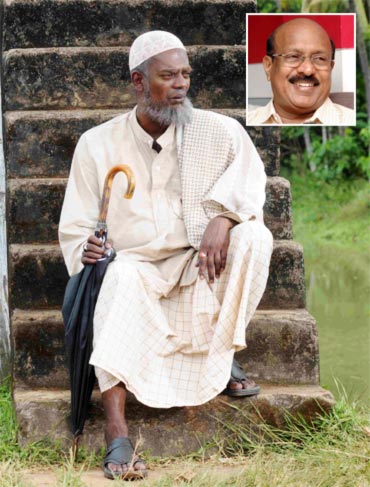
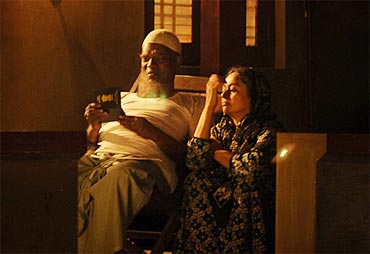
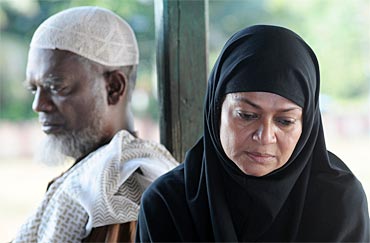
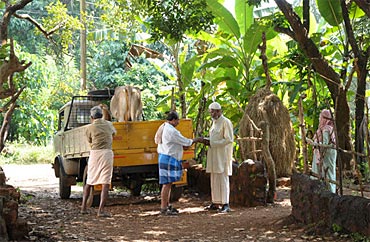
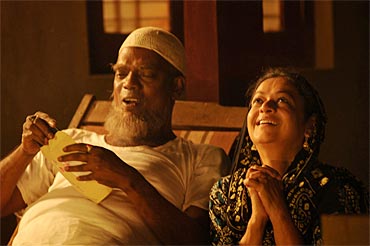
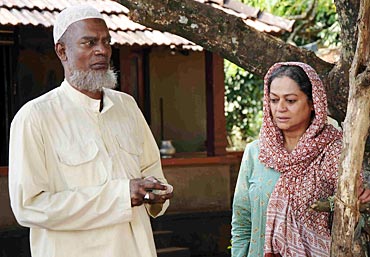
Comment
article